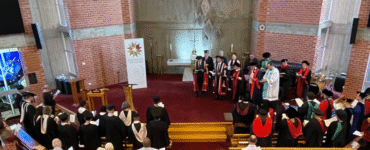Congratulations to our new graduates!
On Thursday 30 November 2017, 73 students of the University graduated, with 26 receiving their award in person at Immanuel College Chapel, Adelaide. Each student attending was presented with a testamur by the Chancellor, Dr Graeme Blackman AO.
The Graduation Address was given by the Geraldine Hawkes, Ecumenical Facilitator of the South Australian Council of Churches. A copy of the address may be read below.
To view pictures and tweets from the ceremony, follow us on Twitter: @UniDivinity #UDgraduate
Gifts of Ecumenism: in, with and for our world
University of Divinity Graduation Address
Immanuel College Chapel, Novar Gardens, South Australia
Thursday 30 November 2017
Thank you for inviting me to share in this celebration of your studies. I offer you my congratulations and recognise, if only from preparing this short paper, how much angst will no doubt have accompanied the necessary research and tangible demonstration of the learning with which you have been engaged over recent years.
I also express a deep admiration for the ecumenical context within which you have studied, and the Vision of the University of Divinity:
Together we empower our learning community to address the issues of the contemporary world through critical engagement with Christian theological traditions.
As you enter into a new phase of life, my hope is that you will continue to engage with the issues of the contemporary world by learning in community, and to connect with a range of Christian theological traditions, so that our life together may be transformed, where power is shared, and the structures and systems created by church and society will flourish for the good of all creation.
This evening, therefore, I want to offer you two words for the journey ahead: love and humility. These are two virtues that undergird a new movement across our churches, entitled Receptive Ecumenism.
Receptive Ecumenism, I believe, has the potential to lead us together towards a healing that seems to be so needed within, across and beyond our churches: a healing from behaviour that abuses power and perpetuates division and dualism.
I’ll unwrap with you what Receptive Ecumenism is and how love and humility illuminate the path; describe something of the practice and impact of this movement which is growing locally and overseas; and, finally, offer something of its potential for the deeper healing of our church and of our world.
Receptive Ecumenism – Love and Humility
Simply put by Professor Paul D Murray, Professor of Systematic Theology in the Department of Theology and Religion, University of Durham, Receptive Ecumenism invites us to ask not “What do the other traditions first need to learn from us?” but “What do we need to learn from them?” Paul suggests that, “if all were asking this question seriously and acting upon it then all would be moving in ways that would both deepen our authentic respective identities and draw us into more intimate relationship”.
He continues:
“Receptive ecumenical awakening is properly a matter of the heart before it is a matter of the head; a matter of falling in love with the experienced presence of God in the people, practices, even structures of another tradition and being impelled thereby to search for ways in which all impediments to closer relationship might be overcome.”
Receptive Ecumenism involves, therefore, a shift from acting towards the other competitively, as rivals for the souls and minds of people, or from thinking that the problem of division would be solved if only of our ecumenical other could become like ‘us’, to thinking and acting with love and humility, to be open to receiving the other as gift, and to seeing the other in the same way as God sees them.
If we believe that we are all made in the image and likeness of God, and that God gazes lovingly on every one of us equally, how can our churches, both as ecclesial institution and as individual people, be further drawn into gazing upon one another and all of creation with that same look of love? What might we discover…how might we respond? How might we become more fully the people, the church, the life that Christ prays that we be?
Questions for pondering:
- What are we holding on to from our perception of the other that prevents us from falling in love with the experienced presence of God in another tradition?
- What blocks, assumptions, myths or biases do we need to let go of so that our eyes may be drawn into gazing on the other in the same way that God gazes on all of creation?
Receptive Ecumenism also requires, and engenders, a disposition of humility.
Sarah Bachelard, in ‘Experiencing God in a Time of Crisis’ writes:
“Central to encounter with God …is the process of stripping away of illusions, of the false self and process of allowing a truer, more authentic self to emerge. This is a process that the New Testament speaks of, using metaphors of ‘dying to self’, ‘leaving self behind’ and ‘losing one’s life to find it’.”
Our tendency has been to apply that ‘dying to self’, ‘leaving self behind’ and ‘losing one’s life to find it’ to the individual journey in faith.
Receptive Ecumenism offers an approach that includes, however, the potential for change across the structures, systems, processes and practices of our church. Over the years we have created, generally with sound theological basis, parishes, boards, committees, councils, synods, agencies – even universities! These evolve and are re-shaped over time, and, as they succumb to other demands, may lose something essential.
Receptive Ecumenism encourages us to be aware of our own institutional weaknesses – our own vulnerabilities – that may be in need of healing. It does not ask us to focus on another church’s vulnerabilities, nor to be telling them about where we think they are wrong and need to be healed. Rather, it is about a healthy recognition of one’s own need for healing, through discerning from time to time any place within our structures, systems, practices and processes that may:
- oppress, obscure, diminish or extinguish our tradition’s core truth around the light of Christ.
- not be an authentic manifestation and conduit of the Gospel and so be a block in liberating us to be drawn closer into Christ and one another.
Practice and Impact
Earlier this year, SA Council of Churches held an event entitled Exchange of Gifts: Reimagining our Unity in Christ through Receptive Ecumenism, using a fishbowl technique. The interactive conversation amongst the 21 participants from a wide variety of churches focused on the learning question: How does your Church welcome newcomers, nurture hospitality and nourish an active congregation? Four responders (from the Coptic Orthodox Church, the Uniting Church, the Roman Catholic Church and the Greek Orthodox Church) opened the conversation by sharing what they had learned about the learning question from listening to answers that people from other churches gave prior to the event. Other participants then entered the conversation, which gradually moved through information and content learning towards deep ecumenical learning on hospitality, welcoming and growing an active congregation, with the potential to draw a part of their own church more fully into the way of Christ.
Feedback from such events has included:
- It immediately felt so welcoming, receptive and hospitable (beginning with light refreshments)
- The ‘others’ listened attentively and graciously, without judgement
- The opportunity to share both positive and negative experiences of our church’s decision making felt well received and any vulnerabilities were really embraced
- The ‘others’ remarked on the volume of new insights they had received
- It was truly holy ground and an amazing privilege to speak openly and to be heard so generously.
The deeper healing of our church and of our world
Australia recently hosted an international conference on Receptive Ecumenism. On the first day, as people arrived in Canberra, three people tell me that they were separately asked by people not necessarily connected to church ‘what is the conference about?’ Each described along the lines of it being a process to help the churches learn from one another, rather than telling one another, in a spirit of love and humility.
The story goes that each person who had asked the question responded, “That’s just what our world needs!”
It seems, therefore, that through discerning what we still have to learn, and opening ourselves to listen lovingly and with humility, both to our ecumenical friends and to the Spirit, we may discover creative and imaginative processes and responses to critical issues affecting our church, and so be drawn more closely into our unity in Christ.
In addition, how we approach healing both within and across the churches, has the potential to heal our divisive and dualistic world, which is so yearning for leadership that is both loving and humble; a world where many Aboriginal people are marginalised and incarcerated, where people live with unemployment across generations, where people live with a disability, where people are excluded from a life that honours their full dignity, whom some perceive or describe as a problem to be solved; and whose gift is overlooked, ignored or even rejected.
Jesus is calling us to speak the truth as he did, to become compassionate and to walk down the ladder into the heart of poverty and pain, both our own and that of others. There we will find the freedom to cherish all the beauty given us, the love, and song, and laughter, and we will then rise up together as a community of forgiveness and celebration knowing what it is like to be his Body. Jean Vanier
May our life together be transformed in Father, Son and Spirit, where power is shared, where the structures and systems created by church and society flourish for the good of all creation, and where together we are a loving and humble sign of justice, peace and unity, in, with and for our world.
Geraldine Hawkes
Ecumenical Facilitator
South Australian Council of Churches
65 Flinders Street, Adelaide SA 5000
Ph: (08) 8215 0300 Email: sacc1@picknowl.com.au





